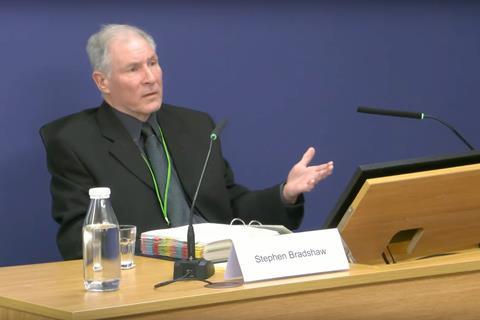A solicitor acting for the Post Office rejected a defence disclosure request because it would cost too much, the public inquiry into the Horizon scandal has heard. Discussing the case of sub-postmaster Grant Allen, solicitor Andrew Bolc emailed investigator Stephen Bradshaw to say the cost to the Post Office of providing branch data could be £2,500.
Bolc, then a solicitor with national firm Cartwright King, said in his email that this option would not be pursued ‘unless it became unavoidable’.
Allen was sentenced in 2013 to a 12-month community order and 200 hours’ unpaid work after a shortfall of £13,000 appeared in the accounts of his Cheshire branch. His conviction was overturned in the Court of Appeal in 2022 and he is now eligible for £600,000 in compensation.
Yesterday’s hearing of the public inquiry into the Post Office scandal featured evidence from Bradshaw, a lead investigator on at least nine cases based on flawed Horizon IT evidence.
Earlier in the day, Bradshaw said a witness statement in court he had signed was actually written by solicitors from Cartwright King.

The investigator told the inquiry he had communicated to Bolc that concerns about costs should not be a consideration when it came to disclosure. Bradshaw said: ‘It’s as if [Bolc] is trying to put it on me to sort of say “Oh it’s too dear, don’t bother with it”. But my stance is, if it’s required for any inquiry or prosecution, you have to get it.’
The data requested by Allen’s defence team was ultimately not provided.
The inquiry heard that, before Allen’s case came to trial, Bolc had emailed Fujitsu expert witness Gareth Jenkins about the sub-postmaster’s contention that losses were attributable to IT problems.
Bolc had said: ‘Ultimately, we would need to discredit this as an explanation that holds any water. He denies stealing the subsequent losses and therefore any implication may be seeking to blame the system for those losses as well.’
Giving evidence to the inquiry before Christmas, Bolc had admitted that this email was not appropriate, adding: ‘I think it was an approach that had been adopted that I’d seen in other documentation and used the same approach, and it wasn’t right.’
The inquiry yesterday heard that in the case of Katherine McQue, a former Kendal sub-postmistress given a suspended sentence in 2011, Bradshaw was sent a memo from the principal lawyer in the case.
This memo outlined there had been discussions between all parties with a view to establishing what pleas would be acceptable.
It continued: ‘An indication was given that a plea to count two fraud might be acceptable so long as the defendant stipulated in her basis of plea that there was nothing wrong with Horizon and that she was responsible for the loss.’
McQue later pleaded guilty to one charge of fraud, accepting there was nothing wrong with Horizon.
After questioning from the inquiry counsel, chair Sir Wyn Williams stepped in to ask: ‘Is it appropriate for someone representing the Post Office to say: “We will accept your plea but only if you don’t blame Horizon”?’
Bradshaw replied: ‘Probably not.’
The inquiry continues today with an update on disclosure issues and then moves on to hearing evidence from representatives of IT contractor Fujitsu.






























